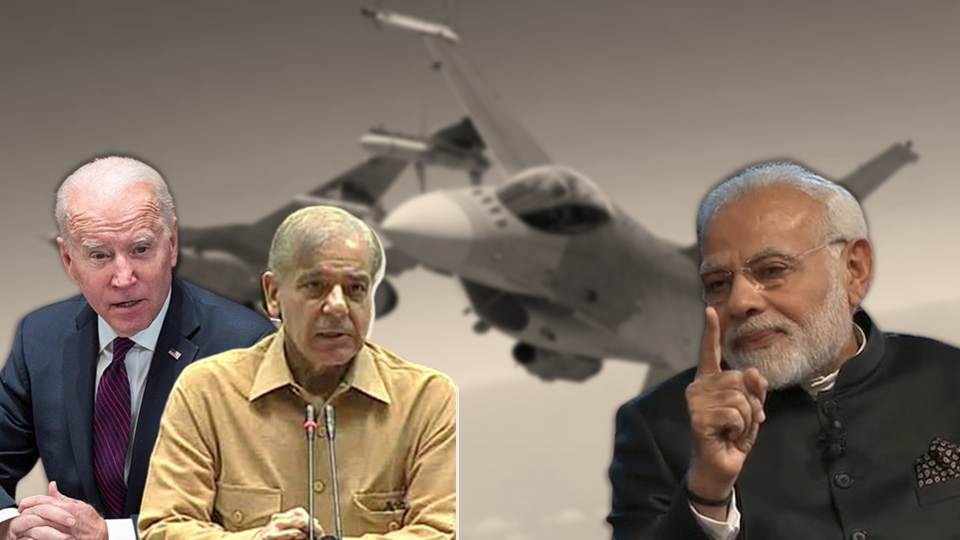The international and the left-leaning cabal are busy criticizing the Indian foreign policies by naming them as ‘opportunistic’. There has been multiple instances where the supposed superpowers denounced India for adopting a hard stance while dealing with several geopolitical crises. But in reality, India is just catering to its diplomatic ties to its national security.
On the other hand, some world powers continue to strengthen their support for India’s neighbour enemy. Apparently, it’s in the wake of India emerging as a superpower disrupting their prolonged hegemony.
US is helping Pakistan with F-16 fighter jets
Recently, Defence Minister Rajnath Singh raised concerns over the United States sustenance package for F-16 to Pakistan. This can be seen as bizarre because on one hand Pakistan is deeply swept under floods, and meanwhile, the US is serving them, not with humanitarian aid but, with fighter jets.
Defence Minister Rajnath Singh raised issues with US Defence Secretary Lloyd Austin over US’s decision to provide a sustenance package for Pakistani F-16 fighters. It was a telephonic conversation in light of a $450 million package for Pakistan under Washington’s Foreign Military Sales programme.
This clearance would pave the way for US manufacturers to sell spares and supplies for Pakistan’s fleet. Meanwhile, the Indian Minister spoke about cooperation in the Indo-Pacific. Discussions also took place on a framework for a long-term arrangement for warship repairs in India.
Apart from this, the Indian Minister said, “We discussed growing convergence of strategic interests and enhanced defence and security cooperation. We also discussed ways to strengthen technological and industrial collaboration and also explore cooperation in emerging and critical technologies.”
Earlier too, New Delhi had expressed its displeasure in contrast to 2016, when the MEA had issued a statement expressing its “disappointment” of the planned sale of F-16s. In regard to which, EAM S. Jaishankar had summoned the US Ambassador to protest.
India has already responded with IPEC and RCEP
The recent disagreement clash over the F-16 package is just another instance of New Delhi and Washington’s standing on different sides of the fence. Meanwhile, the two powers are already under a period of active engagement including Commerce Minister Piyush Goyal’s visit to the U.S. for the IPEF ministerial meetings and bilateral trade talks, as well as a visit of U.S. Deputy Secretary of Treasure Wally Ademeyo at the end of August.
Amidst the US resurrecting ties with Pakistan and the Shehbaz Sharif government, India decided to stay out of the trade pillar of the Indo-Pacific Economic Framework (IPEF). Concerning that any trade agreement may “discriminate” against developing economies over issues like environmental commitments, labour standards, and digital laws, India decided not to become one of the four key pillars of IPEF.
It was seen as a mirror decision of India in regard to its stance on the Regional Comprehensive Economic Partnership (RCEP), which included China but not the US, India chose to opt out. It was due to the unfavourable balance of trade, dumping of Chinese goods, and non-acceptance of auto-trigger mechanism, protection of domestic industries, and lack of consensus on rules of origin.
This decision of stepping out was very much favourable to India, as China could have dumped its products in the Indian market and the domestic industries would have struggled in front of low-cost substandard Chinese products.
Though, the world leaders call India’s stand on IPEC and RCEP, opportunistic. The reality, however, lays a different approach. It’s high time for the hegemonic world powers to understand that they no longer will be able to mould India for their advantage.
Read more: Piyush Goyal repeats his RCEP masterstroke in getting India a berth in IPEF
Ancient Indian love letters to Pakistan
Gone are the days when India used to send love letters to Pakistan. Gone are the days, when India chose silence for retaliation. In 2014, both India and Pakistan held talks expressing their willingness to begin a new era of bilateral relations. In 2015, PM Modi made a surprise visit to Pakistan. India’s ‘Neighbourhood First policy’ came as a cherry on top, in light of a peaceful, prosperous and stable neighbourhood.
Nevertheless, being ranked as the fifth largest economy in the world, India has now become strong enough to retaliate against anyone causing hazards to its interests. It became evident with Indian strikes against Pakistan.
Read more: Decision to carry out air strike in Pakistan was taken by PM Modi himself
India retaliates against anyone who hinders its sovereignty
In 2016, the heroic Indian Army carried out surgical strikes against terror launch pads on and along the Line of Control (LoC). The strikes were carried out on the intervening night of September 28-29, 2016, nearly 10 days after the terror attack when four terrorists launched a barrage of grenades at the Army’s 12 Brigade headquarters in Uri, Jammu and Kashmir. Pakistan to date denies these strikes in order to save its face.
In 2019, India launched surgical airstrikes against militants in the Pakistani territory. It came as retaliation against the Pulwama attack on 14 February 2019, when Pakistani militant group JeM killed nearly 40 Indian troops. It was portrayed as just the beginning, if Pakistan further dares to sponsor cross-border terrorism against India, it might have to face even tougher consequences.
Apart from this, the Indian strength can be witnessed on the Lines of Actual Control (LAC) where it has controlled the Chinese military since almost two years, trying to illegally enter in the Indian borders.
Therefore, it can be noted that India had showered enough love on the world powers. But, it will no longer be silent against the invaders of its national integrity. India very well knows its way of retaliation and has thus, raised issues with the US indirectly aiding terrorism.
Support TFI:
Support us to strengthen the ‘Right’ ideology of cultural nationalism by purchasing the best quality garments from TFI-STORE.COM
